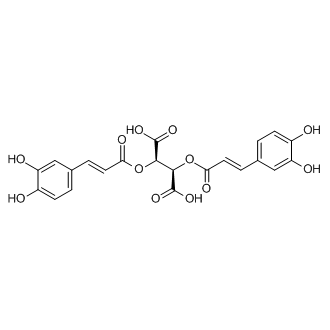| Size | Price | Stock |
|---|---|---|
| 5mg | $46 | In-stock |
| 10mg | $72 | In-stock |
| 25mg | $144 | In-stock |
| 50mg | $252 | In-stock |
| 100 mg | Get quote | |
| 200 mg | Get quote | |
| We match the lowest price on market. | ||
We offer a substantial discount on larger orders, please inquire via [email protected]
or Fax: (86)21-58955996
Inquiry for price and availability only. Please place your order via our email or fax.
| Cat. No. : | HY-N0457 |
| M.Wt: | 474.37 |
| Formula: | C22H18O12 |
| Purity: | >98 % |
| Solubility: | H2O : 100 mg/mL (210.81 mM; Need ultrasonic); DMSO : 1 mg/mL (2.11 mM; Need ultrasonic) |
Chicoric acid (Cichoric acid), an orally active dicaffeyltartaric acid, induces reactive oxygen species (ROS) generation. Chicoric acid inhibits cell viability and induces mitochondria-dependent apoptosis in 3T3-L1 preadipocytes through ROS-mediated PI3K/Akt and MAPK signaling pathways. Chicoric acid increases glucose uptake, improves insulin resistance, and attenuates glucosamine-induced inflammation. Chicoric acid has antidiabetic properties and antioxidant, anti-inflammatory effects[1][2][3].
In Vitro: Chicoric acid (Cichoric acid; 10-200 μM; for 24, 48, and 72 h) causes a dose- and time-dependent decrease in cell viability[1].
Chicoric acid (100 μM; 48 h) induces apoptosis through caspase-3-dependent pathway[1].
Chicoric acid (100 μM; 48 h) decreases the protein level of p-Akt[1].
Chicoric acid (25, 50, 100 µM; for 24 hours) dramatically improves glucose uptake in a dose-dependent manner, and Chicoric acid further enhances insulin-induced (100 nM; 30 min) glucose uptake by 57.7% in HepG2 cells[2].
Chicoric acid (100 µM; for 24 hours) restores glucosamine-induced impairment of GLUT2 translocation through activating PI3K/Akt pathway in HepG2 cells[2].
Chicoric acid (100 µM) has no effects on HepG2 cell viability[2].
In Vivo: Chicoric acid (Cichoric acid; 60 mg/kg/day; drinking water for 4 weeks) inhibits pancreas apoptosis and adjusts islet function in diabetic mice, leading to an increase in insulin generation and secretion in C57BL/6J mice with Streptozotocin (STZ; 50 mg/kg; ip; for consecutive 5 days)[3].
Lorem ipsum dolor sit amet, consectetur adipisicing elit. Autem earum hic iste maiores, nam neque rem suscipit. Adipisci consequatur error exercitationem fugit ipsam optio qui, quibusdam repellendus sed vero! Debitis.
Inquiry Information- Product Name:
- Chicoric acid
- Cat. No.:
- HY-N0457
- Quantity:


Your information is safe with us.